Nowadays it seems that a decadent educational system, decreasing attention spans, and the spread of social media have conflated to create a perfect cocktail of easily-spread ignorance, some of which can be truly harmful.
The ubiquity and accessibility of internet in most countries, facilitates the communication of thoughts and ideas that could potentially reach any point in the planet. However, many times such information is provided devoid of context and authorship, often at risk of being diluted or misinterpreted.
With the prevalence of the internet as one of the main sources of information in most people’s lives nowadays –and sometimes, the main/only one– the ability to discern between potentially harmful misinformation and helpful, balanced and well substantiated information is crucial.
Social media has been more harmful than helpful in this case. Even if you are not directly friends with people who hold superstitious, controversial or simply erroneous beliefs, I can guarantee that this sort of news and articles still get into your feed.
Usually, there is a sense of urgency and danger about these notes, in order to appeal to the readers on an emotional level to make them think it is their duty to spread this information to “help”. It takes no effort to just click the “share” button and contribute to spreading some piece of fake news, instead of doing a quick googling to find more about it and read contrasting views on the matter.
Example: Found this gem in the explore page of my Instagram account:


However, by that point the post had thousands of likes and about fifty comments of people tagging other people while expressing in awe that they had no idea! OMG teflon is terribly damaging for our health and Monsanto wants to poison us! without even bothering to check if it was true.
This behaviour becomes even more worrying when you hear the scary statistic that around 1 in 5 Americans get their news regularly from social media.
Nevertheless, by keeping a few things into account one might be better equipped for discerning between a reliable source of information and a potentially misguiding one; here are some quick tips that can help spotting manipulative and unsound content:
Are they trying to tap into your emotions rather than engaging your intellect or reasoning?
One of the most telltale signs of misinformation is that it is often written in an emotional rather than a neutral tone.
The person writing the text uses phrasing and elements included with the sole aim of eliciting a strong emotional reaction from the reader, to “prime” them into empathizing with their point of view.
As an example, I remember an anti-vaccine article that was in the trending section here on Steemit a while ago. The person who wrote this article, before talking about any of the reasons why they thought it is not OK to vaccinate children, started with a rant about how greed is a terrible thing, and how people who are greedy are the scum of the earth, how corporations are greedy and prey on the innocent, etc. setting already a dark mood on the reader with the very transparent intention of priming them into an us vs them mentality that would make the audience more susceptible to accept his information, even though it had nothing to do with the actual evidence they were bringing to make their point about vaccination being dangerous for children – which was all regurgitated statements that have been long disproved and miscellaneous misconceptions anyway, but I digress.
Most of the time, the emotion they tap into is fear or disgust, although sometimes also positive emotions are used to reinforce a point; in the vaccine article example above, the author provided a video of their child singing and smiling as “proof” that unvaccinated children live healthy, happy lives –however, as cute as it is, this is obviously no real evidence that supports the anti-vaccine claim.
Whenever you look at a website or article with provocative information, ask yourself: does it look like you are reading a tabloid paper? Take these examples:
Does their website/article look like this? (lots of pictures evoking negative emotions, huge font sizes sensationally highlighting words, multiple exclamation marks).
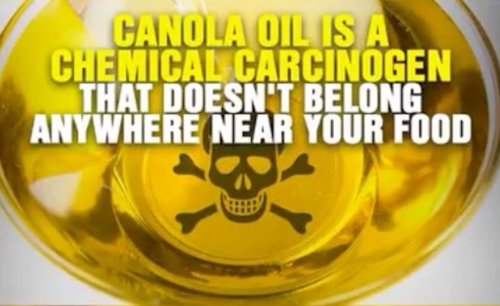
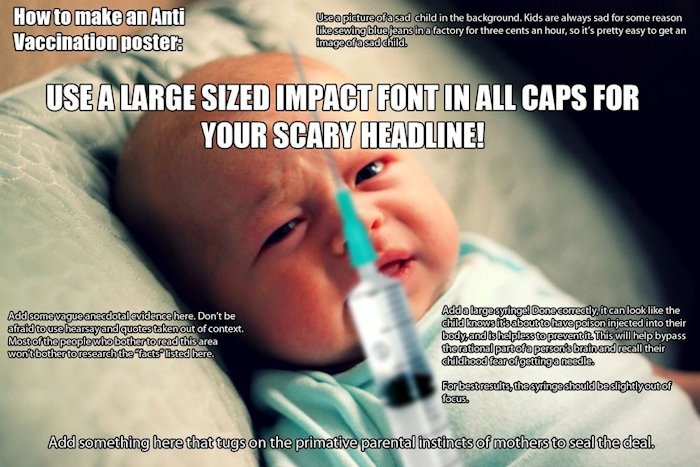
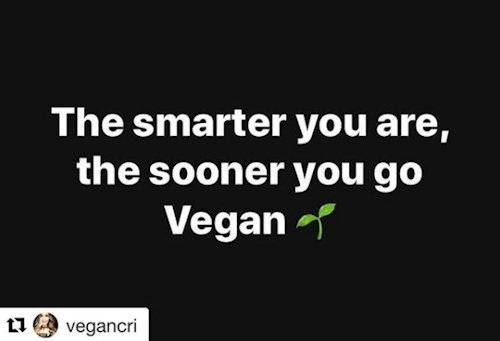

While informative articles usually compare and contrast situations or data, manipulative articles usually include moral judgments or condemning comments over the matter being discussed. Sometimes they are not even that subtle.
Also, this kind of misleading articles often allude to some sort of invisible and sinister force behind things as an explanation, as opposed to research-based articles which usually just state the information available on a certain topic and discuss it comparing it to previous findings or using it to explain certain things.
How many logical fallacies can you spot?
Logic is one of the key weapons on the fight against being duped. If you can not only spot when but also how they are trying to drag you into some tricky chain of thought of questionable veracity, it will be very difficult to misguide you.
The kind of pages I am talking about are like a bingo for logical fallacies. For easy-to-understand definitions on some common logical fallacies, I recommend looking at this chart to get acquainted with them, however there are many more than the ones listed there.
Here are some examples:

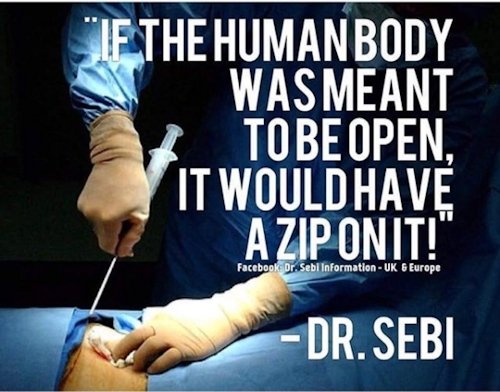

Use of anecdotal evidence as their most solid “proof” vs scientific evidence.
Ask yourself: is the evidence provided even valid or applicable?
While reading a few stories about how some people claim that they got rid of an incurable disease by unconventional methods can be comforting, this isn’t sufficient evidence to support their claims. Firstly, because in these cases usually nobody documented the process in detail (including an accurate diagnose) and then because even in the remote case that this was actually 100% true, the sample size is not enough to make a generalization –in other words, just because someone bought a lottery ticket and won, doesn’t mean that everyone who does the same will win as well!

There is also something called survivorship bias: we get to hear about the people who succeeded since that is the most appealing and inspiring piece of news, but not many people are interested on reading about the many failures from other people trying to do the same, which could be the majority.
Many of these bogus websites contain testimonials formulated on the following way: “I did (dangerous action) and nothing happened, therefore this is proof that it is completely safe to do it!” No, it is not. Whenever you do something that has been proven time and time again to be dangerous and come out unscathed, most likely you were lucky.
The internet has a way to congregate people with similar life experiences, which creates bubbles that misguide people into believing that their exceptional experience is actually the norm. Let’s imagine, for example, that someone makes an online forum for people who don’t believe in looking both ways before crossing the street. I am sure that you would find lots of people who have crossed the street without looking at least once in their lives (myself included) and nothing happened to them. Then they all go to such forums and they relate their experience and get lots of confirmation from other people who have also crossed the street without looking and nothing bad happened. Does this mean that crossing the street without looking is perfectly safe? Of course not!
Check use of sources.
Whenever some important, new or provocative bit of information is shared, it is necessary to know where it came from, and preferably, how this idea or data came to be.
Lack of references/sources, or references that don’t support claims made are a telltale that you should be really cautious about the information being just made up or distorted.
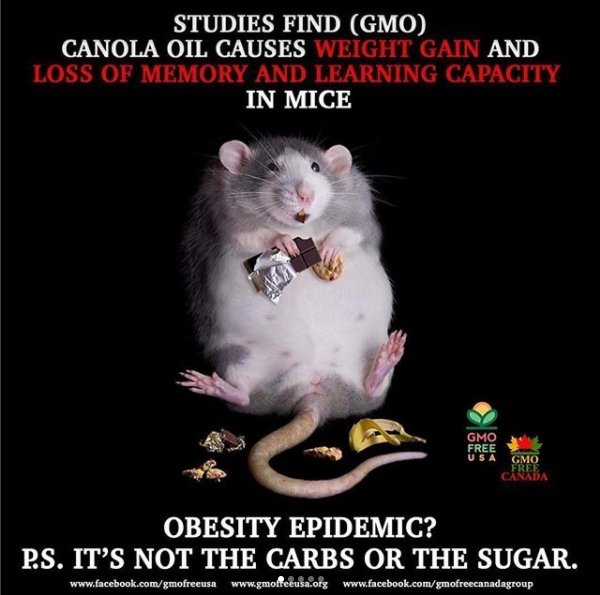
Which studies? How were they conducted? For contrast, take a look at one of the articles I referenced in my past post about alkaline diets. This article, called "The Alkaline Diet: An Evidence-Based Review" was published in a popular website about general health; however, it is well researched. For example:
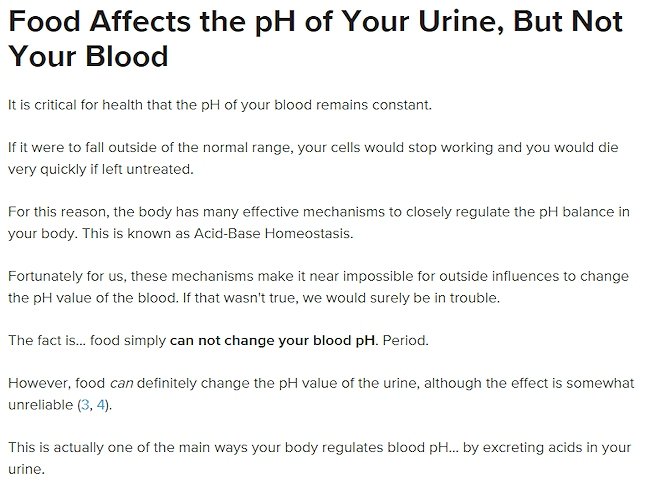
If you click on those reference numbers (3,4) you encounter the original articles that the author of this popular science article used as his source of information, and they both are legit scientific articles published in peer-reviewed journals, that you can read yourself if you want:

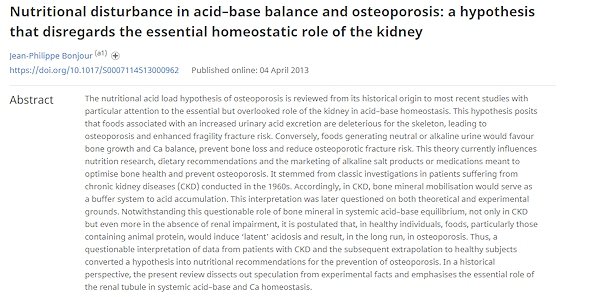
Still, even if they provide sources, one has to be careful to check that the sources cited are actually backing up the claims stated.
Sometimes this dissonance comes from a misunderstanding by a non-specialized person, overlooking some key detail. However, I have come across people who use this as a tactic to deter questioning from those who disagree with their statements: they start spamming with numerous articles that allegedly support their claims but that if you actually read and analyze, are not providing the alleged evidence (I see this happening a lot during debates about vaccination and genetically modified organisms).
If you point out to the person that the evidence in the article(s) does not support their statements, they will just throw another batch of articles at you to read through or ask you to "do your own research" ("burden of proof" fallacy), turning the situation into a one-sided war of attrition where all the burden is placed on the person who is doing the questioning instead of on the person who is supposed to be clarifying, supporting and cementing the claims.
Keeping an open mind.
We all make mistakes, also new findings emerge that can put our current knowledge into question. Sometimes we also ignore or overlook information that is already available and has been confirmed to be truthful.
Always remember that “having an open mind” does not mean accepting all sorts of outlandish beliefs that antagonize the prevalent paradigm that is accepted by most people.
This is what having an open mind is like: when encountering information that contradicts or questions your beliefs or conceptual frame, instead of shutting it down immediately because it doesn’t fit your pre-established context, listen to it; put your skepticism aside for a moment and pay attention to the arguments provided, then analyze them to see if there is any truth to it. You can then decide if you accept this information or not based on the evidence provided, but only after some thoughtful examination.
Furthermore, something that I find especially appalling –and this happens A LOT during election time– is when people strongly believe and support something, but when questioned they can hardly explain why (if at all). Usually the explanation for this is that they have been told so by others or they just “feel” that’s the right option, but never actually bothered to inform themselves and make their own minds about it. In a democratic system, this can have catastrophic consequences, like we have witnessed already (Brexit, Trump, no peace treaty in Colombia, etc.).

I hope this long-winded article helped to stimulate some thoughts about the way we handle information. Finally, I just want to make two notes:
1) I hope this did not come off as preachy since I am guilty myself of sometimes not researching properly when I passingly encounter news, especially those that align with my own paradigms.
2) I am not anti-vegan, I swear! I just happened to find this Instagram page called "Alkaline Vegan News" which was like a cornucopia for all the misinformation examples I wanted to talk about. Actually that's the source of all pictures in this post unless stated otherwise.
Irime
Here's the thing about science.
Most people can't be bothered to remember the very basics of it, and I don't mean the factual underpinnings – I mean the philosophy, the process, the way of thinking that is essentially scientific. Instead, they default to an authoritarian acceptance; any claim must be true, it's only arguments against that claim that need to provide support. They believe this even if two weeks later the exact opposite claim is made by someone else whom they would have required actual support from to counter the previous claim!
I can't blame this on education. The information is there. The history is there. I can't blame this on the media, or even social media. This is the result enculturation to prioritize feelings, particularly immediate feelings, over reason. To respond to emotion with sympathy before critical facility kicks in.
This is why "a study says" is the worst possible thing for one of these people to run into. A study says it? It must be true! Even though, scientifically, we know that any study can be false, and that any study has a pretty good chance of being faults, and that truth is discovered by multiple studies, reproduced in multiple places, by multiple groups of scientists – and anything less is not truth, it's just lower on the spectrum than pure lie.
Try to communicate that to the True Believers and you're going to get blank, glassy stares, and the persistent belief that you are probably some sort of hideous agent of evil sent to corrupt their minds with doubt.
I cannot help having trouble shaking the idea that most people want a God and they don't know how to function in the absence of one. So instead of doing the work to figure out how the world really works, or doing the work to put together a concept of God that actually functions in the context of the scientific philosophy (hint: that's not going to happen, but the effort might educate them in something), they began to worship the academic outputs of the process without understanding or having the tools to interpret those outputs.
Dr. Oz? He's a doctor! Whatever he says about medicine must be true. Dr. Phil? He's a doctor! Oprah loves them! Whatever he says about minds must be true. Climate change? Settled science! Whatever our chosen Messiah of the moment says about climate change must be true.
It is a means of belief which is all about science but is not penetrated by science.
My personal preference for solving the problem would be to throw people off of roofs until a few learn to fly, and then sell them to the highest bidder. Some may have called that a little excessive.
Short of that, the only thing I can think of is to keep plodding onward, keep trying to get a deeper understanding of how science works in front of people, show them that it works, show them why it works, show them that the continuous chain of it working has led to lives which are neither nasty, brutish nor short compared to our forbearers.
It will be difficult. People love a crisis. People love a panic. People of both of those things went secretly, in their hearts, the they know they're not real – the crisis will never come to a crisis; the panic will never come to a panic, and freed of the responsibility of the results, those that wish to indulge can be as histrionic as they like.
And that brings us right back to the top where the modern media enterprises start.
@lextenebris Wow, thanks a lot for this contribution to the topic! I have some comments:
I agree completely that the ability to being reproducible is what makes a study or finding solid and reliable, however I wouldn't go as far as to say that anything that hasn't been replicated many times is slightly better than a lie. It might well be true but lacks robustness and scrutiny in order to be taken as a generally applicable principle (or maybe this is what you meant?).
This is what I find most difficult dealing with: when people are shutting you down a priori because they decided that they don't trust anything that comes from science, then trying to reason and explain the evidence at hand becomes an impossible task.
Personally I don't know what the best way to deal with this recalcitrant attitude could be. Maybe your approach (which requires a lot of patience) could help to plant some seeds of real knowledge, although in my experience people like this would to anything to avoid admitting they might be wrong even if they start having doubts.
If it walks like a duck, and it talks like a duck – you are probably not best served by making decisions as if it were a chicken.
Something hasn't been replicated many times, it is structurally indistinguishable from a lie. It might be true, just as any live might be true, but without verifiability and someone taking the steps to verify it, a clever and wise person should never use that information for judgment.
This is a much higher bar than "generally applicable principle." It is indistinguishable from a lie. This is far more insidious if it happens to be something that you want to believe.
That's the trap that a lot of these people fall into.
I have simply taken to accepting that people who don't trust anything that comes from science have tacitly agreed that I can take from them anything that comes from science. If it doesn't exist, or it's an agency of evil, or it's an invalid way to make decisions, then clearly I'm protecting them and they should support me in protecting them – by taking their computers, their cell phones, their health, their primary, secondary, and tertiary means of socialization, the ability to move further than a swift jog…
You know, things. Derived from science. I'm helping!
Well, there is a real and true alternative.
We could kill all of them.
It's not like they would have particularly good weapons. Comparatively. Once you toss scientific thought, your weapons development strategy goes right out the window. I'm pretty sure we could take them.
That is a lot of work, however, so I am generally disinclined to bother. In the long run, their belief system is effectively self-defeating because it demands that they take inefficient options at every turn. So ultimately, science wins. In the short term, we just have to learn how to mock them openly and without hesitation, twisting the knife whenever possible. If nothing we say can really make a difference, enjoy the performance art.
Great post! It's incredibly frustrating when some misleading or outright false claims are automatically taken as fact. Steemit is no exception to this problem. Hopefully your article helps a few people on this platform take the time to evaluate what they're seeing on this platform.
Yes, in fact I have noticed that for some reason Steemit seems to have a higer-than-normal concentration of people posting this kind of "alternative facts". I wonder why that is...
Great article @irime. It is really frustrating to see that the statements "a recent study shows .... ", is enough to create a "fact". But I can understand how people get misled. I mean, even my email browser has a "news" section with "health news". It is just so convenient to access, in comparison to actually searching and reading a scientific study
The problem is that people get very emotional about these "facts". It is the common narrative of them against us. Maybe this is due to the actual isolation resulting from the rise of social media and being against vaccinations makes them feel part of a group.
I wish more people would study science. It really trains you to think critical and actually read the sources. Furthermore you get access to actual studies.
Cheers!
Thanks for this very thoughtful comment, @lesshorrible! Very well put.
There's a reason we had to learn how to write scientific papers and cite papers in school. Taught us what we can trust vs what is fake news.
People who spread the fake news like canola oil, Teflon coated pans, and many more must have skipped the classes on "How To Write And Cite Scientific Papers."
So true that people take social media as their new sources now. A simple Google search can prove or disprove what memes claim. But people are too lazy to do any research work.
Great article @irime!
Exactly! It only takes a few minutes to find out. I know that many of us assume things without confirming for sure (especially if it aligns with something we already accepted or believe in), but at least we all should be more responsible about what we share with others, to avoid spreading misinformation.
Thanks for your comment, @cabernet :-)
That is the first science article you wrote I can understand.
When it comes to diet there is a lot of Broscience around.
I am far away from being an expert or even educated on this topic so I kind of have to trust my sources but would not blindly follow advice from a random guy in the gym.
While I am pro vegan despite not being one there is so much bullshit floating around hurting the cause.
I can only speak for myself but a science "meme" on facebook I would never trust blindly but I have been probably been manipulated by that as well when you see them more often and in other form.
Great article.
Oh, boy... so it seems like I have a long way to go becoming a successful science communicator! I will keep trying :-P
Ugh, yes, Fitness is one of the topics that are heavily polluted with all sorts of nonsensical advice and unsubstantiated claims. At least now there are some people who are talking about the topic to wider audiences in a more scientific way, for example Jeff Nippard and Stephanie Buttermore on youtube, they make videos that are very well researched, easy to understand and entertaining about different aspects of fitness and training.
Actually I thought about making a post about good and reliable science-backed sources for fitness advice, maybe I will write it in the near future. :-)
Wow awesome stuff. I tend to either not research much at all, or go nuts and into analysis paralysis.
Your last 2 posts have helped me get to a happy medium when the info is all in the same place so thanks.
Don't worry about "long winded." So far, the posts have been long but packed with good detail. Such a good part of my feed. Keep it up!
I really appreciate you taking some time to write such amazing feedback @zekepickleman :-)
Thanks a lot for reading and glad it was helpful and not too tedious...
Ugh, thank you for this post. Ive just about had it with Facebook and all the fear-mongering clickbait posts I have to see everytime I log onto it. It's gotten so old. Especially the comment section where people argue over articles with no real research being cited or stating their own personal anecdotes. So thank you. We need more of these posts to educate people to THINK logically and NOT emotionally about the content they come across on feeds.
Thanks to you for this comment, @absoluteama!
Interesting read, cant agree any more. I see a lot lot of people re-posting information without first confirming it. But its the internet and we cant control everything but we can control our self, like you said we are also sometimes guilty of sharing information without confirming the authenticity of it.
Looking forward to read more interesting posts from you, thats why i just followed you. :)
It might seem like a small deed, but if we start by changing ourselves, at least we are doing our part on stopping the uncontrolled spread of misinformation.
Thanks a lot for the support! @shikra
vs
Which message is delivered faster?
But seriously, one of the problems is, that admitting that you are wrong, is really painful for some people and they will put into use all tricks of cognitive dissonance to remain in the "right".
Ironically I think the first picture depicts perfectly how many people must feel about my articles...
I hope people read this and think about it. I have nothing more to add right now, other than I agree with the major points. Resteemed and Tweeted.
Yeaaa... at first I thought it was too long but then I read it and could relate to it
During my first year in school.. I was taught fallacies.. distinguishing between vital information and cover story... this goes a long way to show that I didn't learn In vain
Thanks a lot for the support, @kenny-crane. I really appreciate it :-)
Waw!!!! This is the best article I have read so far.... So rich In information. Painstakingly written and well organised. You are a genius in the making....beautiful post. I really loved reading through it, I can confidently say I am more enriched with more knowledge, thanks to you. Wonderful masterpiece!
Very great post.
That a news is widely circulated often makes people believe its true.
No way of scientifically identifying fake news from genuine ones but we should always try to screen what we hear before believing.
@irime, this is a great, fun read, as always. I definitely have family members who live and die based on the meme news they receive on Facebook. It's funny, there are all of the tells you point out here, including a host of logical fallacies - but it always strikes me, for the craziest ones, that the big giveaway isn't just "wait, this is batshit crazy."
Having said that, I'm always worried that I am susceptible to, and heaven forfend, responsible for, a different type of misinformation - the good faith, but ultimately incorrect reporter.
That's part of the reason I'm so big on disclaimers for my mycology posts for example - I really try to thoroughly inform myself before I make any statement of fact - but at the end of the day I'm just a bozo on the internet without any specialized training beyond auto-didactic study. And as much I think there's value in solo learning, I also see how the internet enables a different kind of ignorance in that regard - possibly even a more insidious ignorance than Facebook news.
Wow, great article! This was very thought provoking and well stated. This is the kind of thing that is missing from our schools (at least the ones where I'm from)--how to think for yourself. Upvoted, Resteemed, Following.
Thanks a lot for the support, @arinfinite!
Sadly, I can only upvote you once.
This looks long but once you start reading it's not, I read many shorter articles every day that are tougher to read through. Goes to show real length is not the same as subjective length.
Nice adding the second note at the end, cos I was having the thought while reading the vegan memes that "they're kinda right tho"! Maybe cos literally right before reading this post I watched this.
I agree with everything in this post. Some people are so obsessed with organic food, anti vax and see themselves as "smart" and looking down to people who aren't... resteemed!
Thanks a lot, @fathin-shihab :-)
@ireme I like your posts. Actually sometimes we really never think of finding out the source of the things that people shared and will simply share it out to others especially when we think it's good but we don't know it's true or not. This posts reminds me that from now onwards I should be more careful before sharing anything. Thanks.
@veenalo, that's a very healthy and responsible attitude. Kudos! And thanks for commenting.
We humans are the easiest machine to hack. Topic stomach ulcers, pain reliever pill or medical marijuana; can the brain heal the shell if it believes the shell is resting. @irime may you have a great weekend.
Thanks, you too!
Excerpt from Seattleorganicrestaraunts.com
http://www.seattleorganicrestaurants.com/vegan-whole-foods/dupont-history/
Check the article link for names.
Maybe you can see why I would question your motives for writing this article. I wonder who you work for.
What is your point? Did @irime advocate Monsanto & DuPont? I think you should read more carefully. Furthermore you can read her blog and find out that she is doing a PHD in Molecular Biology in Germany and does not work for any of those corporations.
You are totally missing the point of the post.
No reason to check out irime's blog. I checked out your blog. Cloud Atlas is my favorite movie. I absolutely live by the quote on your banner. I do not trust accepted mainstream science. We are lied to by governments and people in power on a mind blowing scale. Are you so sure the institutions where you were "educated " were telling you the truth? Unless you work for the dark side we are on the same side. We want the truth. My comment was an attempt to get people to question where and who their "facts" come from. These corporations control the institutions of education. Everyone thinks they have the real facts because they believe in their sources.
There is no such thing as "mainstreem science", there is just science & faith-based systems. It doesn't matter who makes an assertion, what matters is how you reach a conclusion. The scientific method provides the tools to verify if a hypothesis can be accepted with an acceptable degree of certainty.
This post highlights how most people just believe stuff based on nothing but faith and emotion instead checking it out themselves or better yet use the scientific method to test a conclusion. Dismissing something just because it comes from a particular source is just as bad as accepting something else because it originates from "trusted" one...both are different faces of the same coin.
Acceptable degree of certainty is not fact. What was thought to be a proven scientific fact 50 years ago today can seem down right silly. The scientific method was used by the "scientists" who said cigarettes were safe. We can't all spend our lives in a laboratory, researching, we must choose someone to believe. Knowing who employs a "scientist" is very important. The criminal corporations have proven time and again they will lie about science to achieve a desired end.
So you are saying every university in the world, every biotech start-up, every brewery, every state, every research institution and every planetarium is a criminal corporation?
I know it seems hard to understand, but most scientists decide to be scientists because they love what they are doing. As a matter of fact, to be a scientist you spend roughly 3-4 years in college, 3-5 years working on your PhD, 1-3 years on post-doc (all this in universities usually), and then start out with roughly 40k a year. It is a lot of effort and not a lot of gain. So stating that science is all about money is absolutely wrong. Science is more passion than people think. Science is not about dollar signs. So I would rather trust a peer-reviewed paper, than a magazine that needs blow up every minor story to intrigue people to buy their paper (same applies to websites). I think that scienctists are more critical than all the conspracists that claim to be critical.
Yes, theories change. But that is because science is critical with itself and considers new evidence that arises (which I cannot say about most "scepticists". Cheers
Well said.
Sorry to disappoint you, but my involvement in science is a lot less sinister than you seem to imagine. Here is a post were I wrote about my story:
https://steemit.com/science/@irime/the-story-of-a-curious-child-that-became-a-scientist-how-i-got-into-science
TL;DR: I was just a very curious person who was always interested in understanding how nature worked, and I studied really hard during many years to be able to work at what I do. My latest work was centered in cancer research - and no, I was not sponsored by any evil company, I was just trying to understand the molecular mechanisms that make cancer resistant to treatment, because we want to find a way to cure it.
https://steemit.com/health/@truthtrain/my-top-4-read-food-labels-supplements
@irime Got a 33.12% Vote via @steem-global
Make sure to include the link to your post in the memo field of the transfer!
( Any amounts < 1.000 STEEM or SBD will be considered donations )
If the message is, look into veganism - you go girl :)
Thanks for calling our attention to this!
https://m.youtube.com/watch?v=aCJVS1DXiiY
He says what I was trying to convey way better than me. Please watch this if you really want to cure cancer.